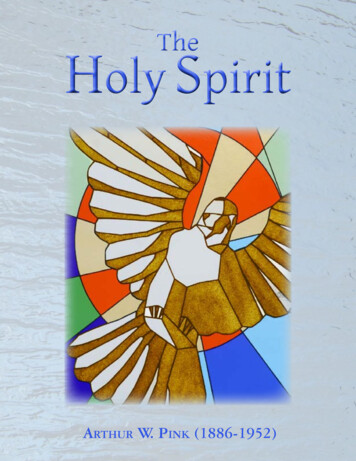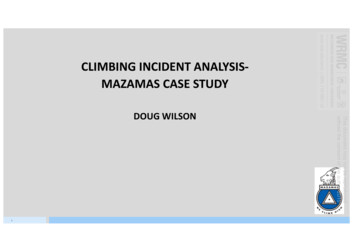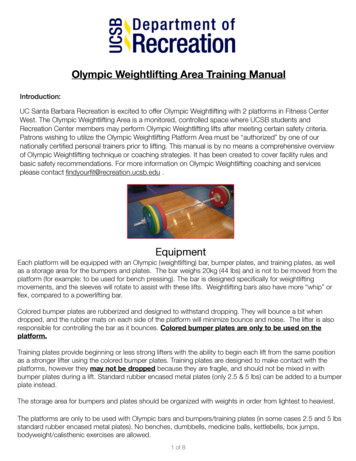
Transcription
TheHoly SpiritArthur W. Pink (1886-1952)
The Holy e Holy Spirit . 3The Personality of the Holy Spirit . 7The Deity of the Holy Spirit . 11The Titles of the Holy Spirit. 14The Covenant-Offices of the Holy Spirit . 18The Holy Spirit During the Old Testament Ages. 21The Holy Spirit and Christ . 25The Advent of the Spirit . 31The Work of the Spirit . 43The Holy Spirit Regenerating . 49The Spirit Quickening . 55The Spirit Enlightening . 62The Spirit Convicting . 68The Spirit Comforting. 74The Spirit Drawing . 80The Spirit Working Faith . 86The Spirit Uniting to Christ . 89The Spirit Indwelling. 92The Spirit Teaching . 98The Spirit Cleansing . 104The Spirit Leading . 111The Spirit Assuring . 117The Spirit Witnessing . 123The Spirit Assisting . 131The Spirit Interceding . 137The Spirit Transforming . 143The Spirit Preserving . 154The Spirit Confirming . 160The Spirit Fructifying . 165The Spirit Endowing . 170Honoring the Spirit . 176
How This Book OriginatedArthur W. Pink (1886-1952) published Studies in the Scriptures as a monthly 28 page booklet from 1922to 1953. Each issue contained continuing serialized articles on six to eight subjects. When one subjectwas completed to the author’s satisfaction, another subject series was begun in its place in the nextissue. In total, the 380 issues comprise a treasure of immense proportions.Today the various subjects are being gathered together by topic and republished by several sources.Chapel Library currently offers the following paperbacks online and in print: The Sovereignty of God(176 pages), Comfort for Christians (79), Profiting from the Word (96), Seven Sayings of the Savior (94),Spiritual Union and Communion (175), The Attributes of God (84), The Doctrine of Human Depravity (236),The Doctrine of Revelation (214), The Doctrine of Sanctification (256), 1 John – An Exposition, Part 1 (190),1 John – An Exposition, Part 2 (173), The Holy Spirit (196), The Heroes of Faith (262).The Holy Spirit is composed of articles that appeared in Studies from 1933 to 1937. In this Chapel Library edition of The Holy Spirit, references to “prior article” have been changed to read “prior chapter,”etc. Also, the text has been annotated to include footnotes of difficult words, biographies of those quoted, headings to assist the reader, and occasional addition of clarifying words to Pink’s text, which areplaced in brackets [ ]. When a Scripture quotation includes parentheses, they are maintained. Pinksometimes added his own comments within parentheses to quotations from Scripture or another author; in this edition his words are enclosed in brackets (to distinguish from the use of parentheses inthe original). Copyright 1999 Chapel Library: annotations. Printed in the USA. Permission is expressly granted toreproduce this material by any means, provided1) you do not charge beyond a nominal sum for cost of duplication;2) this copyright notice and all the text on this page are included.Chapel Library is a faith ministry that relies entirely upon God’s faithfulness. We therefore do not solicit donations, but we gratefully receive support from those who freely desire to give. Chapel Librarydoes not necessarily agree with all the doctrinal positions of the authors it publishes.Worldwide, please download material without charge from our website, or contact the internationaldistributor as listed there for your country.In North America, for additional copies of this booklet or other Christ-centered materials from priorcenturies, please contactCHAPEL LIBRARY2603 West Wright StreetPensacola, Florida 32505 USAPhone: (850) 438-6666 Fax: (850) 438-0227chapel@mountzion.org www.ChapelLibrary.orgA study guide is also available. For it or information about other Bible study materials and correspondence courses (often based on texts from prior centuries), please contact Mount Zion Bible Institute at the address above. MZBI courses may be downloaded worldwide without charge fromwww.ChapelLibrary.org.
1THE HOLY SPIRITIn the past, having given consideration to the attributes of God our Father, and thento a contemplation of some of the glories of God our Redeemer, it now seems fitting thatthese should be followed by this series on the Holy Spirit. The need for this is real andpressing, for ignorance of the Third Person of the Godhead is most dishonoring to Himand highly injurious to ourselves. The late George Smeaton of Scotland 1 began his excellent work upon the Holy Spirit by saying,“Wherever Christianity has been a living power, the doctrine of the Holy Spirit hasuniformly been regarded, equally with the Atonement and Justification by faith, as thearticle of a standing or falling church. The distinctive feature of Christianity as it addresses itself to man’s experience, is the work of the Spirit, which not only elevates itfar above all philosophical speculation, but also above every other form of religion.”The Importance of Studying the Holy SpiritNot at all too strong was the language of Samuel Chadwick 2 when he said,“The gift of the Spirit is the crowning mercy of God in Christ Jesus. It was for thisall the rest was. The Incarnation and Crucifixion, the Resurrection and Ascensionwere all preparatory to Pentecost. Without the gift of the Holy Spirit all the restwould be useless. The great thing in Christianity is the gift of the Spirit. The essential, vital, central element in the life of the soul and the work of the Church is thePerson of the Spirit” (Joyful News, 1911).The great importance of a reverent and prayerful study of this subject should be apparent to every real child of God. The repeated references made to the Spirit by Christ inHis final discourse (Joh 14-16) at once intimates 3 this. The particular work that has beencommitted to Him furnishes clear proof of it. There is no spiritual good communicatedto anyone but by the Spirit; whatever God in His grace works in us, it is by the Spirit.The only sin for which there is no forgiveness is one committed against the Spirit (Mar3:28-29). How necessary is it then that we should be well instructed in the Scripturedoctrine concerning Him! The great abuse there has been in all ages under the pretense1George Smeaton (1814-1889) – Scottish theologian; professor both at Free Church College inAberdeen and New College Edinburgh.2Samuel Chadwick (1840-1932) – Joined his father working 12 hour shifts in a cotton mill at age 8;became lay pastor in Lancashire at 21. He served in larger Methodist churches, lectured at CliffCollege in 1904 and became principal in 1913, and did mission work in the South Yorkshire coalfields.3intimates – suggests; implies.
4THE HOLY SPIRITof His holy name, should prompt us to diligent study. Finally, the awful ignorance thatnow so widely prevails upon the Spirit’s office and operations, urges us to put forth ourbest efforts.Yet important as is our subject, and prominent as is the place given to it in Holy Writ,it seems that it has always met with a considerable amount of neglect and perversion.4Thomas Goodwin commenced his massive work on The Work of the Holy Spirit in OurSalvation (1660) by affirming,“There is a general omission in the saints of God, in their not giving the Holy Spiritthat glory that is due to His Person and for His great work of salvation in us, insomuch that we have in our hearts almost forgotten this Third Person.”If that could be said in the midst of the balmy days of the Puritans, what language wouldbe required to set forth the awful spiritual ignorance and impotency of this benighted20th century!In the Preface to his Lectures on “The Person, Godhead, and Ministry of the Holy5Spirit” (1817), Robert Hawker wrote,“I am the more prompted to this service, from contemplating the present awful dayof the world. Surely the ‘last days’ and the ‘perilous times,’ so expressly spoken of bythe Spirit, are come (1Ti 4:1). The flood gates of heresy are broken up, and are pouring forth their deadly poison in various streams through the land. In a more daringand open manner the denial of the Person, Godhead, and ministry of the Holy Spiritis come forward and indicates the tempest to follow. In such a season it is needful tocontend, and that earnestly, ‘for the faith once delivered unto the saints.’ Now in amore awakened manner ought the people of God to remember the words of Jesus,and ‘to hear what the Spirit saith unto the churches’ (Rev 2:7ff).”So again, in 1880, George Smeaton wrote, “We may safely affirm that the doctrine ofthe Spirit is almost entirely ignored.” And let us add, wherever little honor is done to theSpirit, there is grave cause to suspect the genuineness of any profession of Christianity.Against this, it may be replied, Such charges as the above no longer hold good. Would toGod they did not, but they do. While it be true that during the past two generationsmuch has been written and spoken on the person of the Spirit, yet, for the most part, ithas been of a sadly inadequate and erroneous character. Much dross has been mingledwith the gold. A fearful amount of unscriptural nonsense and fanaticism has marred thetestimony. Furthermore, it cannot be denied that it is no longer generally recognizedthat supernatural agency is imperatively required in order for the redemptive work of4Thomas Goodwin (1600-1680) – Born in Norfolk, educated at Cambridge, vicar of Holy TrinityChurch, Cambridge. After becoming a Congregationalist, persecution drove him to pastor a church inHolland in 1639. He returned to serve in the Westminster Assembly. Served as president ofMagdalen College, Oxford.5Robert Hawker (1753-1827) – Vicar of the Anglican Church, born in Exeter, served at CharlesChurch, Plymouth; known as a superlative preacher, bold evangelical, caring father; active ineducation and help for the poor and needy of the parish; a scholar and author of many books; deeplybeloved of his parishioners.
1. The Holy Spirit5Christ to be applied to sinners. Rather do actions show it is now widely held that if unregenerate souls are instructed in the letter of Scripture, their own will-power is sufficientto enable them to “decide for Christ.”The Problem: Effort in the FleshIn the great majority of cases, professing Christians are too puffed up by a sense ofwhat they suppose they are doing for God, to earnestly study what God has promised todo for and in His people. They are so occupied with their fleshly efforts to “win souls forChrist,” that they feel not their own deep need of the Spirit’s anointing. The leaders of“Christian” (?) enterprise are so concerned in multiplying “Christian workers” thatquantity, not quality, is the main consideration. How few today recognize that if thenumber of “missionaries” on the foreign field were increased twenty-fold the next year,that that, of itself, would not ensure the genuine salvation of one additional heathen?Even though every new missionary were “sound in the faith” and preached only “thetruth,” that would not add one iota 6 of spiritual power to the missionary forces withoutthe Holy Spirit’s unction and blessing! The same principle holds good everywhere. If theorthodox seminaries and the much-advertised Bible institutes turned out 100 timesmore men than they are now doing, the churches would not be one bit better off thanthey are, unless God vouchsafed a fresh outpouring of His Spirit. In like manner, noSunday School is strengthened by the mere multiplication of its teachers.O my readers, face the solemn fact that the greatest lack of all in Christendom today isthe absence of the Holy Spirit’s power and blessing. Review the activities of the past 30years. Millions of dollars have been freely devoted to the support of professed Christian enterprises. Bible institutes and schools have turned out “trained workers” by the thousands.Bible conferences have sprung up on every side like mushrooms. Countless booklets andtracts have been printed and circulated. Time and labour have been given by an almost incalculable number of “personal workers.” And with what results? Has the standard of personal piety advanced? Are the churches less worldly? Are their members more Christ-likein their daily walk? Is there more godliness in the home? Are the children more obedientand respectful? Is the Sabbath Day being increasingly sanctified and kept holy? Has thestandard of honesty in business been raised?The NeedThose blest with any spiritual discernment can return but one answer to the abovequestions. In spite of all the huge sums of money that have been spent, in spite of all thelabour that has been put forth, in spite of all the new workers that have been added tothe old ones, the spirituality of Christendom is at a far lower ebb today than it was thirtyyears ago. Numbers of professing Christians have increased, fleshly activities have multiplied, but spiritual power has waned. Why? because there is a grieved and quenchedSpirit in our midst. While His blessing is withheld there can be no improvement. What is6iota – smallest letter in the Greek language, meaning the smallest thing.
6THE HOLY SPIRITneeded today is for the saints to get down on their faces before God, cry unto Him in thename of Christ to so work again, that what has grieved His Spirit may be put away andthe channel of blessing once more be opened.Until the Holy Spirit is again given His rightful place in our hearts, thoughts, and activities, there can be no improvement. Until it be recognized that we are entirely dependent upon His operations for all spiritual blessing, the root of the trouble cannot bereached. Until it be recognized that it is “Not by might [of trained workers], nor by power [of intellectual argument or persuasive appeal], but by my spirit, saith the Lord” (Zec4:6), there will be no deliverance from that fleshly zeal which is not according toknowledge, and which is now paralyzing Christendom. Until the Holy Spirit is honored,sought, and counted upon, the present spiritual drought must continue. May it pleaseour gracious God to give the writer messages and prepare the hearts of our readers toreceive that which will be to His glory, to the furtherance of His cause upon earth, andto the good of His dear people. Brethren, pray for us.
2THE PERSONALITYOF THE HOLY SPIRITIf we were asked to state in a comprehensive form what constitutes (according to ourviews of Scripture) the blessedness of the Lord’s people on earth after His work of graceis begun in their souls, we would not hesitate to say that it must be wholly made up ofthe personal knowledge of and communion with the glorious Trinity in their Persons inthe Godhead—for as the church is chosen to be everlastingly holy and everlastingly happy, in uninterrupted communion with God in glory when this life is ended, the anticipation of it now by faith must form the purest source of all present joy. But thiscommunion with God in the Trinity of His Persons cannot be enjoyed without a clearapprehension of Him. We must know under divine teaching God in the Trinity of HisPersons, and we must also know from the same source the special and personal acts ofgrace by which each glorious Person in the Godhead has condescended to make Himselfknown unto His people, before we can be said to personally enjoy communion with eachand all.We offer no apology, then, for devoting a separate chapter to the consideration of thepersonality of the Holy Spirit, for unless we have a right conception of His glorious being, it is impossible that we should entertain right thoughts about Him, and thereforeimpossible for us to render to Him that homage, love, confidence, and submission whichare His due. To the Christian who is given to realize that he owes to the personal operations of the Spirit every divine influence exercised upon him from the first moment ofregeneration until the final consummation in glory, it cannot be a matter of little importance for him to aspire after the fullest apprehension of Him that his finite facultiesare capable of—yea, he will consider no effort too great to obtain spiritual views of Himto Whose divine grace and power the effectual means 1 of his salvation through Christ areto be ascribed. 2 To those who are strangers to the operations of the blessed Spirit in theheart, the theme of this chapter is likely to be a matter of unconcern, and its details wearisome.Figurative or Literal PersonalitySome of our readers may be surprised to hear that there are men professing to beChristians who flatly deny the personality of the Spirit. We will not sully these pages by12means – instruments through which God works to communicate to the hearts of men.ascribed – attributed as to a cause.
8THE HOLY SPIRITtranscribing their blasphemies, but we will mention one detail to which appeal is madeby the spiritual seducers, because some of our friends have possibly experienced a difficulty with it. In the second chapter of Acts, the Holy Spirit was said to be “poured out”(v. 18) and “shed abroad” (v. 33). How could such terms be used of a Person? Very easily:that language is figurative, and not literal; literal it cannot be, for that which is spiritualis incapable of being materially “poured out.” The figure is easily interpreted: as water“poured out” descends, so the Spirit has come from heaven to earth; as a “pouring” rainis a heavy one, so the Spirit is freely given in the plentitude of His gifts.Aspects of PersonalityHaving cleared up, we trust, what has given difficulty to some, the way is now openfor us to set forth some of the positive evidence. Let us begin by pointing out that a “person” is an intelligent and voluntary entity, of whom personal properties may be trulypredicated. A “person” is a living entity, endowed with understanding and will, being anintelligent and willing agent. Such is the Holy Spirit: all the elements that constitutepersonality are ascribed to and found in Him.“As the Father hath life in Himself, and the Son has life in Himself, so has the HolySpirit—since He is the Author of natural and spiritual life to men, which He couldnot be unless He had life in Himself; and if He has life in Himself, He must subsistin Himself” (John Gill 3).1. Personal properties are predicated of the Spirit. He is endowed with understandingor wisdom, which is the first inseparable property of an intelligent agent: “the Spiritsearcheth all things, even the deep things of God” (1Co 2:10). Now to “search” is an actof understanding, and the Spirit is said to “search” because He “knoweth” (v. 11). He isendowed with will, which is the most eminently distinguishing property of a person: “Allthese things worketh that one and selfsame Spirit, dividing unto every man as he will”(1Co 12:11)—how utterly meaningless would be such language were the Spirit only aninfluence or energy! He loves: “I beseech you, brethren, for the Lord Jesus Christ’s sake,and for the love of the Spirit” (Rom 15:30)—how absurd would it be to speak of the “loveof the Spirit” if the Spirit were nothing but an impersonal breath or abstract quality!2. Passive personal properties are ascribed to the Holy Spirit: that is to say, He is theObject of such actions of men as none but a person can be. “Ye agree together to temptthe Spirit of the Lord” (Act 5:9)—rightly did John Owen say,“How can a quality, an accident, an emanation 4 from God be tempted? None canpossibly be so but he that hath an understanding to consider what is proposed untohim, and a will to determine upon the proposals made.”3John Gill (1697-1771) – Baptist minister, theologian, and biblical scholar. Author of A Complete Bodyof Doctrinal and Practical Divinity, The Cause of God and Truth, and his nine-volume Expositions of theOld and New Testaments. Born in Kettering, Northamptonshire, England.4emanation – flowing forth.
2. The Personality of the Holy Spirit9In like manner, Ananias is said to “lie to the Holy Spirit” (Act 5:3)—none can lie untoany other but such a one as is capable of hearing and receiving a testimony. In Ephesians4:30 we are bidden not to “grieve the Holy Spirit”—how senseless would it be to talkabout “grieving” an abstraction, like the law of gravity. Hebrews 10:29 warns us that Hemay be “done despite unto.”3. Personal actions are attributed to Him. He speaks: “The Spirit speaketh expressly”(1Ti 4:1); “he that hath an ear, let him hear what the Spirit saith unto the churches”(Rev 2:7). He teaches: “The Holy Spirit shall teach you in the same hour what ye oughtto say” (Luk 12:12); “He shall teach you all things” (Joh 14:26). He commands or exercises authority: a striking proof of this is found in Acts 13:2, “The Holy Spirit said, Separate unto me Barnabas and Saul for the work whereunto I have called them”—howutterly misleading would such language be if the Spirit were not a real person! He intercedes: “The Spirit itself maketh intercession for us” (Rom 8:26)—as the intercession ofChrist proves Him to be a person, and a distinct one from the Father, unto Whom Heintercedes, so the intercession of the Spirit equally proves His personality, even His distinct personality.4. Personal characters are ascribed to Him. Four times over the Lord Jesus referred tothe Spirit as “The Comforter” and not merely as “comfort”; inanimate things, such asclothes, may give us comfort, but only a living person can be a “comforter.” Again, He isthe Witness: “The Holy Spirit also is a witness to us” (Heb 10:15); “The Spirit itselfbeareth witness with our spirit that we are the children of God” (Rom 8:16)—the term isa forensic one, denoting the supplying of valid evidence or legal proof; obviously, only anintelligent agent is capable of discharging such an office. He is Justifier and Sanctifier:“But ye are sanctified, but ye are justified in the name of the Lord Jesus, and by the Spirit of God” (1Co 6:11).5. Personal pronouns are used about Him. The word pneuma in the Greek, like “spirit” in the English, is neuter, nevertheless the Holy Spirit is frequently spoken of in themasculine gender: “The Comforter, which is the Holy Spirit, whom the Father will sendin my name, he shall teach you all things” (Joh 14:26)—the personal pronoun could not,without violating grammar and propriety, be applied to any other but a person. Referringagain to Him, Christ said, “If I depart, I will send him unto you” (Joh 16:7)—there is noother alternative than to regard the Holy Spirit as a Person, or to be guilty of the frightful blasphemy of affirming that the Savior employed language which could only misleadHis Apostles and bring them into fearful error. “I will pray the Father that he shall giveanother Comforter” (Joh 14:16)—no comparison would be possible between Christ (aPerson) and an abstract influence.Borrowing the language of the revered John Owen, we may surely say,“By all these testimonies we have fully confirmed what was designed to be proved bythem, namely, that the Holy Spirit is not a quality, as some speak, residing in thedivine nature; not a mere emanation of virtue and power from God; not the actingof the power of God in and unto our sanctification—but a holy, intelligent subsistent, or Person.”
10THE HOLY SPIRITMay it please the Eternal Spirit to add His blessings to the above, apply the same to ourhearts, and make His adorable Person more real and precious to each of us. Amen.
3THE DEITY OF THEHOLY SPIRITIn the last chapter we endeavored to supply from the testimony of Holy Writ abundantand clear evidence that the Holy Spirit is a conscious, intelligent, personal Being. Ourpresent concern is the nature and dignity of His Person. We sincerely trust that our present inquiry will not strike our readers as being a superfluous one: surely any mind thatis impressed with a due reverence for the subject we are upon will readily allow that wecannot be too minute and particular in the investigation of a point of such infinite importance. While it be true that almost every passage that we brought forward to demonstrate the Spirit’s personality also contained decisive proof of His Godhead, yet wedeemed the present aspect of our subject of such importance as to be justly entitled to aseparate regard—the more so, as error at this point is fatal to the soul.Deity or Not DeityHaving shown, then, that God’s Word expressly and unequivocally teaches that theSpirit is a Person, the next question to be considered is, Under what character are we toconsider Him? What rank does He occupy in the scale of existence? It has been truly saidthat,1“He is either God, possessing, in a distinction of Person, an ineffable unity of thedivine nature with the Father and the Son, or He is the creature of God, infinitelyremoved from Him in essence and dignity, and having no other than a derivative excellence in that rank to which He is appointed in creation. There is no medium betwixt the one and the other. Nothing intermediate between the Creator and createdcan be admissible. So that, were the Holy Spirit to be placed at the top of all creation, even as high above the highest angel as that angel transcends the lowest reptile of animated life, the chasm would be still infinite; and He, who is emphaticallycalled the Eternal Spirit, would not be God” (Robert Hawker).We will now endeavor to show from the Word of truth that the Holy Spirit is distinguished by such names and attributes, that He is endowed with such a plentitude of underived power, and that He is the Author of such works as to altogether transcend finiteability, and such as can belong to none but God Himself. However mysterious and inexplicable to human reason the existence of a distinction of Persons in the essence of the1ineffable – incapable of being expressed; indescribable.
12THE HOLY SPIRITGodhead may be, yet if we submissively bow to the plain teachings of the divine oracles, 2then the conclusion that there subsists three divine Persons Who are co-essential, coeternal, and co-equal is unavoidable. He of Whom such works as the creation of the universe, the inspiration of the Scriptures, the formation of the humanity of Christ, the regeneration and sanctification of the elect, is and must be GOD; or, to use the language of2 Corinthians 3:17, “Now the Lord is that Spirit.”Proofs of the Spirit’s Deity1. The Holy Spirit is expressly called God. To Ananias Peter said, “Why hath Satanfilled thine heart to lie to the Holy Spirit?” and then in the very next verse he affirms,“thou hast not lied unto men, but unto God ” (Act 5:3-4): if, then, lying to the Holy Spiritis lying to God, it necessarily follows that the Spirit must be God. Again, the saints arecalled “the temple of God,” and the reason proving this is that, “the Spirit of Goddwelleth in you” (1Co 3:16). In like manner, the body of the individual saint is designated “the temple of the Holy Spirit,” and then the exhortation is made, “therefore glorifyGod in your body” (1Co 6:19-20). In 1 Corinthians 12, where the diversity of His gifts,administrations, and operations are mentioned, He is spoke
The Holy Spirit Contents 1. . professor both at Free Church College in Aberdeen and New College Edinburgh. 2 Samuel Chadwick (1840-1932) - Joined his father working 12 hour shifts in a cotton mill at age 8; . a scholar and author of many books; deeply beloved of his parishioners. 1. The Holy Spirit 5





